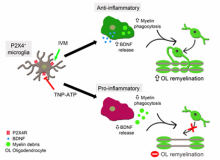Abraham Martin and Jordi Llop, members of the Molecular Imaging Unit at CIC biomaGUNE participated in the promising discovery published by the prestigious scientific journal EMBO Molecular Medicine.
The research identifies a receptor known as P2X4 present in the microglial cells that increases their anti-inflammatory potential in order to reduce the damage in Multiple Sclerosis and, above all, encourage the body’s own repair responses.
This experimental development was conducted using animal models of this disease, thanks to which it was possible to discover that the drugs that activate this receptor improve the symptoms during the chronic phase of the disease when furthering the repair of the nervous tissue.
I has been possible to improve the symptoms in the chronic phase of the disease while encouraging the repair of the nervous tissue, and the challenge now is to move the research forward in humans.
Multiple Sclerosis is an autoimmune disease that attacks and destroys a structure known as the “myelin sheath”, whose integrity is indispensable for the brain and spinal cord to function properly.
Current treatment of Multiple Sclerosis is based on modulating the activity of the immune system or preventing its cells from accessing the central nervous system and damaging it. These therapies are effective in the early phases of the disease, but they do not prevent its advance and the progressive functional deterioration.
During the progressive phase of the disease it is the microglial cells in the brain that are the main cause of the chronic inflammation responsible for the neurological deterioration. These microglial cells are the brain’s sentries and react when faced with any damage or infection in it. This reaction, which is in principle beneficial, becomes harmful when it is prolonged over time, leading to chronic inflammation, and aggravates the disease and encourages its progression.
The study was led by the UPV/EHU, the Achucarro centre, ciberNed and CIC biomaGUNE, in collaboration with the University of Hamburg, and the Institut de Génomique Fonctionnelle in Montpellier.
P2X4 receptor controls microglia activation and favors remyelination in autoimmune encephalitis
Zabala, A; Vazquez‐Villoldo, N; Rissiek, B; Gejo, J; Martin, A; Palomino, A; Perez‐Samartín, A; Pulagam, KR; Lukowiak, M; Capetillo‐Zarate, E; Llop, J; Magnus, T; Koch‐Nolte, F; Rassendren, F; Matute, C; Domercq, M.
EMBO Mol. Med 2018, e8743, DOI: 10.15252/emmm.201708743

